高一英语必修一第五单元课文
- 格式:doc
- 大小:19.50 KB
- 文档页数:3
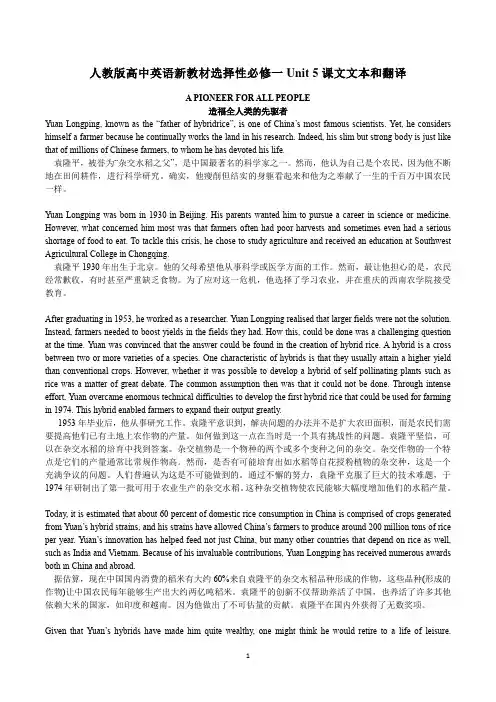
人教版高中英语新教材选择性必修一Unit 5课文文本和翻译A PIONEER FOR ALL PEOPLE造福全人类的先驱者Yuan Longping, known as the “father of hybridrice”, is one of China’s most famous scientists. Yet, he considers himself a farmer because he continually works the land in his research. Indeed, his slim but strong body is just like that of millions of Chinese farmers, to whom he has devoted his life.袁隆平,被誉为“杂交水稻之父”,是中国最著名的科学家之一。
然而,他认为自己是个农民,因为他不断地在田间耕作,进行科学研究。
确实,他瘦削但结实的身躯看起来和他为之奉献了一生的千百万中国农民一样。
Yuan Longping was born in 1930 in Beijing. His parents wanted him to pursue a career in science or medicine. However, what concerned him most was that farmers often had poor harvests and sometimes even had a serious shortage of food to eat. To tackle this crisis, he chose to study agriculture and received an education at Southwest Agricultural College in Chongqing.袁隆平1930年出生于北京。
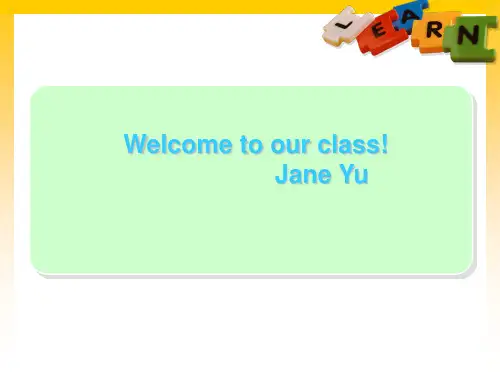
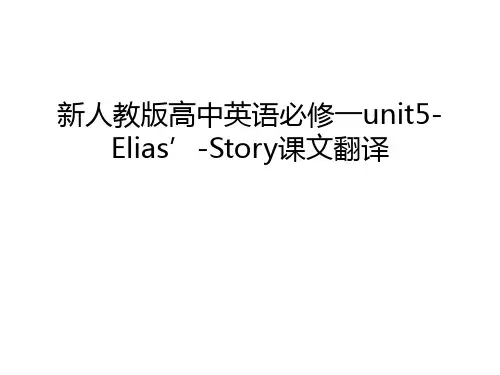
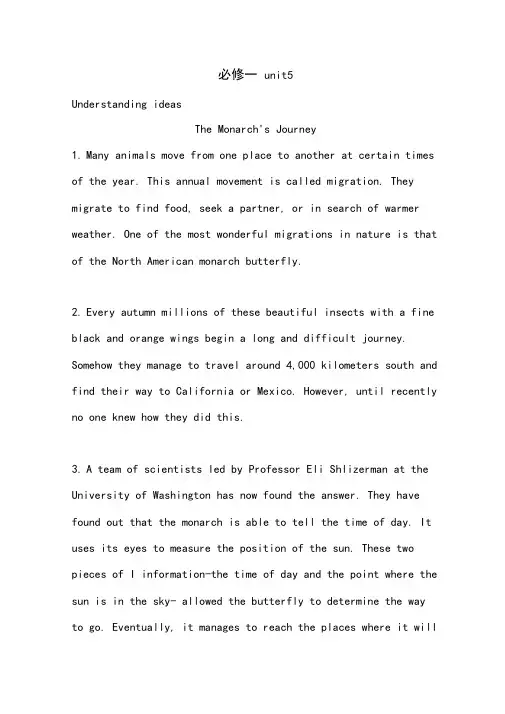
必修一unit5Understanding ideasThe Monarch's Journey1.Many animals move from one place to another at certain times of the year. This annual movement is called migration. They migrate to find food, seek a partner, or in search of warmer weather. One of the most wonderful migrations in nature is that of the North American monarch butterfly.2.Every autumn millions of these beautiful insects with a fine black and orange wings begin a long and difficult journey. Somehow they manage to travel around 4,000 kilometers south and find their way to California or Mexico. However, until recently no one knew how they did this.3.A team of scientists led by Professor Eli Shlizerman at the University of Washington has now found the answer. They have found out that the monarch is able to tell the time of day. It uses its eyes to measure the position of the sun. These two pieces of I information-the time of day and the point where the sun is in the sky- allowed the butterfly to determine the way to go. Eventually, it manages to reach the places where it willspend the winter.4.The solution to the mystery of the monarch's amazing ability comes at a time when it is in serious trouble. Its population has crashed by as much as 90 percent in the last few years. Sadly, human activity is the main reason why the number of monarch butterflies is falling. In many of the places where the butterfly can be found, people are destroying the natural environment. They cut down trees and use chemicals that killed plants that monarch caterpillars eat.5.The research on the monarch's behavior has however led to a greater awareness of this creature. People have been working together to record its migration and make sure that there are enough plans for it to feed on. If this works, there may come a time when the number of monach butterflies increases once again. The more we know about this lovely creature, the greater the chance it will survive and keep its place in the natural world for a long time to come.Developing ideasAn Encounter with Nature1.As a nature photographer, I have to brave the elements. But despite the wind and the rain I still enjoy working outside in the wild. One of the best things about this job is that you canobserve animals in their naturalenvironment.2.My favorite place to take photos is Yellowstone National Park. As the world's first national park, Yellowstone is famous for the variety of its wildlife, but it is probably best known for its bears. These huge, strong animals can live for 30 years. Despite a weight of up to 300 kilograms, they can run at a speed of around 64 kilometers per hour and are also excellent swimmers.st spring in Yellowstone, I followed a path that took me through a dark forest. When I finally stepped out of the trees, the view was breathtaking. An eagle flew over the snow capped mountains which were reflected in the still lake below. Well, I was concentrating on photographing this amazing scene, I suddenly had a feeling that I was being watched. Slowly, and with the camera still held to my eye, I turned... and froze.Only meters away from me was a bear. With water falling off its thick, brown hair, the bear stared back at me. Time stood still as the bear and I both waited to see who would move first. My legs started shaking. Somehow, I forced my finger to press the button. A second later, the bear turned and ran back into the forest. When I recovered from the shock, I looked at my camera. My most frightening but magical experience was now captured forever in a single image.4.From time to time I looked at the photo as a reminder to show respect to all animals. It is after all we who are the visitors to their world.Writing an animal fact of fileThe red -crowned crane is one of the largest cranes in the world, standing at about 150 cm tall. Its feathers are as white as snow, except for some black ones on its face, neck and wings. It's unique feather, from which it gets its name is the bright red skin on the top of its head. The red- crowned crane is found in China, Russia, Mongolia, Japan and the Korean Peninsula. In China, it spends the warmer months in the riversand wetlands in the north-east. When the weather gets cold, it migrates to east- central China. It's food includes fish, snails and water plants. The red -crowned crane is a symbol of long life and good luck in Chinese culture.。
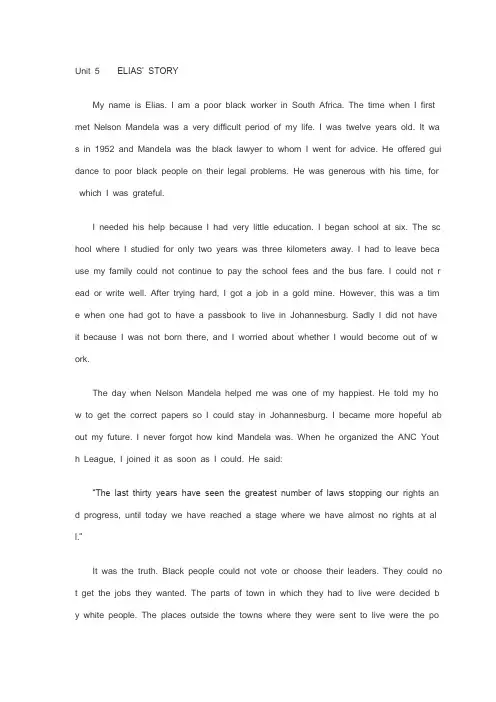
Unit 5ELIAS’ STORYMy name is Elias. I am a poor black worker in South Africa. The time when I first met Nelson Mandela was a very difficult period of my life. I was twelve years old. It wa s in 1952 and Mandela was the black lawyer to whom I went for advice. He offered gui dance to poor black people on their legal problems. He was generous with his time, for which I was grateful.I needed his help because I had very little education. I began school at six. The sc hool where I studied for only two years was three kilometers away. I had to leave beca use my family could not continue to pay the school fees and the bus fare. I could not r ead or write well. After trying hard, I got a job in a gold mine. However, this was a tim e when one had got to have a passbook to live in Johannesburg. Sadly I did not have it because I was not born there, and I worried about whether I would become out of w ork.The day when Nelson Mandela helped me was one of my happiest. He told my ho w to get the correct papers so I could stay in Johannesburg. I became more hopeful ab out my future. I never forgot how kind Mandela was. When he organized the ANC Yout h League, I joined it as soon as I could. He said:“The last thirty years have seen the greatest number of laws stopping our ri ghts an d progress, until today we have reached a stage where we have almost no rights at al l.”It was the truth. Black people could not vote or choose their leaders. They could no t get the jobs they wanted. The parts of town in which they had to live were decided b y white people. The places outside the towns where they were sent to live were the poorest parts of South Africa. No one could grow food there. In fact as Nelson Mandela said:“…we were put into a position in which we had either to accept we w ere less impo rtant or fight the government. We chose to attack the laws. We first broke the law in away which was peaceful; when this was not allowed…only then did we decide to answer violence with violence.As a matter of fact, I do not like violence…b ut in 1963 I helped him blow up some government buildings. It was very dangerous because if I was caught I could be put inprison. But I was happy to help because I knew it would help us achieve our dream of making black and white people equal.THE REST OF ELIAS' STORYYou cannot imagine how the name of RobbenIsland made us afraid. It was a prison from which no one escaped. There I spent the hardest time of my life. But when I gotthere Nelsom Mandela was also there and he helped me. Mr Mandela began a schoolfor those of us who had little learning. He taught us during the lunch breaks and the evenings when we should have been asleep. We read books under our blankets and used anything we could find to make candles to see the words. I became a good student.I wanted to study for my degree but I was not allowed to do that. Later, Mr Mandela allowed the prison guards to join us. He said they should not be stopped from studying for their degrees. They were not cleverer than me , but they did pass their exams. So Iknwe I could get a degree too. That made me feel good about myself.When I finished the four years in prison, I went to find a job. Since I was better educa ted, I got a job working in an office. However, the police found out and told my boss that I had been in prinson for blowing up government buildings. So I lost my job. I did not work again for twenty y ears until M r Mandela and the ANC came to power in 1994. All that time my wife and children had to beg for good and help from relatives or friends. Luckily Mr Mandela remembered me and gave me a job taking tourists around my old prison on Robben Islannd. I felt bad the first time I talked to a group. All the terror and fear of that time came back to me. I remembered the beatings and the cruelty of the guards and my friends who had died. I felt I would not be able to do it, but my family encouraged me. They said that the job and the pay from the new South African government were my reward after working all my life for equal rights for the Blacks. So now at 51 I am proud to sho w visitors over the prison, for I helped to make our people free in their own land.。
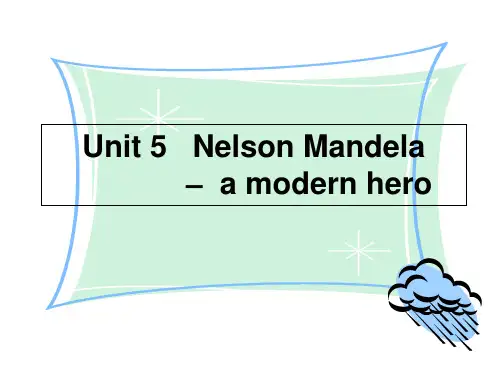
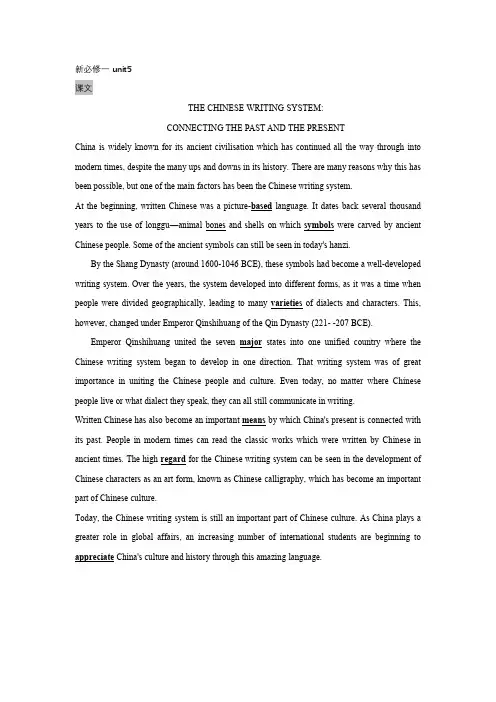
新必修一unit5课文THE CHINESE WRITING SYSTEM:CONNECTING THE PAST AND THE PRESENTChina is widely known for its ancient civilisation which has continued all the way through into modern times,despite the many ups and downs in its history.There are many reasons why this has been possible,but one of the main factors has been the Chinese writing system.At the beginning,written Chinese was a picture-based language.It dates back several thousand years to the use of longgu—animal bones and shells on which symbols were carved by ancient Chinese people.Some of the ancient symbols can still be seen in today's hanzi.By the Shang Dynasty(around1600-1046BCE),these symbols had become a well-developed writing system.Over the years,the system developed into different forms,as it was a time when people were divided geographically,leading to many varieties of dialects and characters.This, however,changed under Emperor Qinshihuang of the Qin Dynasty(221--207BCE).Emperor Qinshihuang united the seven major states into one unified country where the Chinese writing system began to develop in one direction.That writing system was of great importance in uniting the Chinese people and culture.Even today,no matter where Chinese people live or what dialect they speak,they can all still communicate in writing.Written Chinese has also become an important means by which China's present is connected with its past.People in modern times can read the classic works which were written by Chinese in ancient times.The high regard for the Chinese writing system can be seen in the development of Chinese characters as an art form,known as Chinese calligraphy,which has become an important part of Chinese culture.Today,the Chinese writing system is still an important part of Chinese culture.As China plays a greater role in global affairs,an increasing number of international students are beginning to appreciate China's culture and history through this amazing language.中文书写系统:连接过去和现在中国以其一直延续到现代的古老文明而闻名,尽管在它的历史上有许多起起落落。
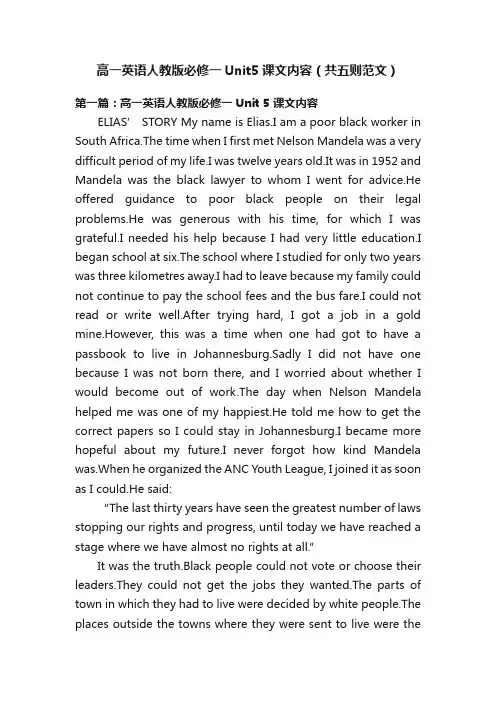
高一英语人教版必修一Unit5课文内容(共五则范文)第一篇:高一英语人教版必修一Unit 5 课文内容ELIAS’ STORY My name is Elias.I am a poor black worker in South Africa.The time when I first met Nelson Mandela was a very difficult period of my life.I was twelve years old.It was in 1952 and Mandela was the black lawyer to whom I went for advice.He offered guidance to poor black people on their legal problems.He was generous with his time, for which I was grateful.I needed his help because I had very little education.I began school at six.The school where I studied for only two years was three kilometres away.I had to leave because my family could not continue to pay the school fees and the bus fare.I could not read or write well.After trying hard, I got a job in a gold mine.However, this was a time when one had got to have a passbook to live in Johannesburg.Sadly I did not have one because I was not born there, and I worried about whether I would become out of work.The day when Nelson Mandela helped me was one of my happiest.He told me how to get the correct papers so I could stay in Johannesburg.I became more hopeful about my future.I never forgot how kind Mandela was.When he organized the ANC Youth League, I joined it as soon as I could.He said:“The last thirty years have seen the greatest number of laws stopping our rights and progress, until today we have reached a stage where we have almost no rights at all.”It was the truth.Black people could not vote or choose their leaders.They could not get the jobs they wanted.The parts of town in which they had to live were decided by white people.The places outside the towns where they were sent to live were thepoorest parts of South Africa.No one could grow food there.In fact as Nelson Mandela said:“…we were put into a position in which we had either to accept we were less important, or fight the government.We chose to attack the laws.We first broke the law in a way which was peaceful;when this was not allowed…only then did we decided to answer violence with violence.”As a matter of fact, I do not like violence…but in 1963 I helped him blow up some government buildings.It was very dangerous because if I was caught I could be put in prison.But I was happy to help because I knew it would help us achieve our dream of making black and white people equal.THE REST OF ELIAS’ STORY You cannot imagine how the name of Robben Island made us afraid.It was a prison from which no one escaped.There I spent the hardest time of my life.But when I got there Nelson Mandela was also there and he helped me.Mr Mandela began a school for those of us who had little learning.He taught us during the lunch breaks and the evenings when we should have been asleep.We read books under our blankets and used anything we could find to make candles to see the words.I became a good student.I wanted to study for my degree but I was not allowed to do ter, Mr Mandela allowed the prison guards to join us.He said they should not be stopped from studying for their degrees.They were not cleverer than me, but they did pass their exams.So I knew I could get a degree too.That made me feel good about myself.When I finished the four years in prison, I went to find a job.Since I was better educated, I got a job working in an office.However, the police found out and told my boss that I had been in prison for blowing up government buildings.So I lost my job.I did not workagain for twenty years until Mr Mandela and the ANC came to power in 1994.All that time my wife and children had to beg for food and help from relatives or friends.Luckily Mr Mandela remembered me and gave me a job taking tourists around my old prison on Robben Island.I felt bad the first time I talked to a group.All the terror and fear of that time came back to me.I remembered the beatings and the cruelty of the guards and my friends who had died.I felt I would not be able to do it, but my family encouraged me.They said that the job and the pay from the new South Africa government were my reward after working all my life for equal rights for the Blacks.So now I am proud to show visitors over the prison, for I helped to make our people free in their own land.第二篇:高一英语必修一UNIT5教案篇一:高一英语必修一unit5教学设计教材分析我教的是高一年级上册,人教版,必修1,unit5, nelson mandela---a modern hero 的第一课,这是一节高中阅读课。
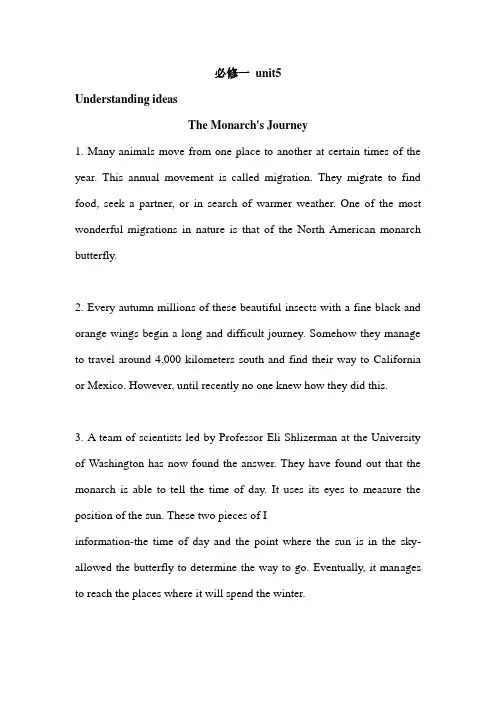
必修一unit5Understanding ideasThe Monarch's Journey1. Many animals move from one place to another at certain times of the year. This annual movement is called migration. They migrate to find food, seek a partner, or in search of warmer weather. One of the most wonderful migrations in nature is that of the North American monarch butterfly.2. Every autumn millions of these beautiful insects with a fine black and orange wings begin a long and difficult journey. Somehow they manage to travel around 4,000 kilometers south and find their way to California or Mexico. However, until recently no one knew how they did this.3. A team of scientists led by Professor Eli Shlizerman at the University of Washington has now found the answer. They have found out that the monarch is able to tell the time of day. It uses its eyes to measure the position of the sun. These two pieces of Iinformation-the time of day and the point where the sun is in the sky- allowed the butterfly to determine the way to go. Eventually, it manages to reach the places where it will spend the winter.4. The solution to the mystery of the monarch's amazing ability comes ata time when it is in serious trouble. Its population has crashed by as much as 90 percent in the last few years. Sadly, human activity is the main reason why the number of monarch butterflies is falling. In many of the places where the butterfly can be found, people are destroying the natural environment. They cut down trees and use chemicals that killed plants that monarch caterpillars eat.5. The research on the monarch's behavior has however led to a greater awareness of this creature. People have been working together to record its migration and make sure that there are enough plans for it to feed on. If this works, there may come a time when the number of monach butterflies increases once again. The more we know about this lovely creature, the greater the chance it will survive and keep its place in the natural world for a long time to come.Developing ideasAn Encounter with Nature1. As a nature photographer, I have to brave the elements. But despite the wind and the rain I still enjoy working outside in the wild. One of the best things about this job is that you can observe animals in their naturalenvironment.2. My favorite place to take photos is Yellowstone National Park. As the world's first national park, Yellowstone is famous for the variety of its wildlife, but it is probably best known for its bears. These huge, strong animals can live for 30 years. Despite a weight of up to 300 kilograms, they can run at a speed of around 64 kilometers per hour and are also excellent swimmers.3. Last spring in Yellowstone, I followed a path that took me through a dark forest. When I finally stepped out of the trees, the view was breathtaking. An eagle flew over the snow capped mountains which were reflected in the still lake below. Well, I was concentrating on photographing this amazing scene, I suddenly had a feeling that I was being watched. Slowly, and with the camera still held to my eye, I turned... and froze. Only meters away from me was a bear. With water falling off its thick, brown hair, the bear stared back at me. Time stood still as the bear and I both waited to see who would move first. My legs started shaking. Somehow, I forced my finger to press the button. A second later, the bear turned and ran back into the forest. When I recovered from the shock, I looked at my camera. My most frightening but magical experience was now captured forever in a single image.4. From time to time I looked at the photo as a reminder to show respect to all animals. It is after all we who are the visitors to their world.Writing an animal fact of fileThe red -crowned crane is one of the largest cranes in the world, standing at about 150 cm tall. Its feathers are as white as snow, except for some black ones on its face, neck and wings. It's unique feather, from which it gets its name is the bright red skin on the top of its head. The red- crowned crane is found in China, Russia, Mongolia, Japan and the Korean Peninsula. In China, it spends the warmer months in the rivers and wetlands in the north-east. When the weather gets cold, it migrates to east- central China. It's food includes fish, snails and water plants. The red -crowned crane is a symbol of long life and good luck in Chinese culture.。
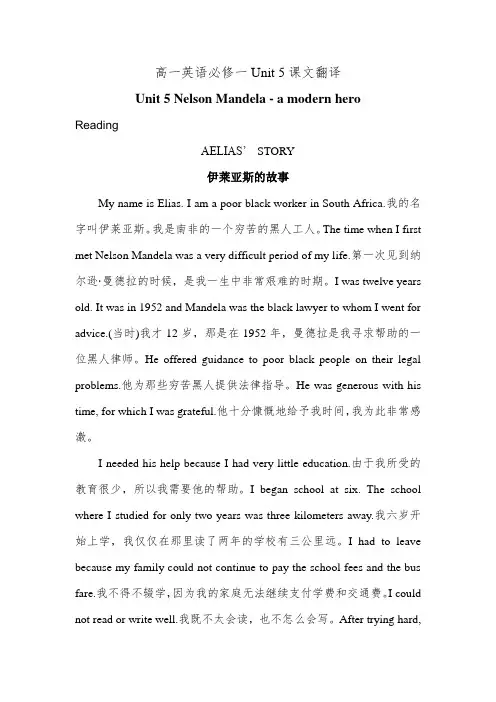
高一英语必修一Unit 5课文翻译Unit 5 Nelson Mandela - a modern heroReadingAELIAS’ STORY伊莱亚斯的故事My name is Elias. I am a poor black worker in South Africa.我的名字叫伊莱亚斯。
我是南非的一个穷苦的黑人工人。
The time when I first met Nelson Mandela was a very difficult period of my life.第一次见到纳尔逊·曼德拉的时候,是我一生中非常艰难的时期。
I was twelve years old. It was in 1952 and Mandela was the black lawyer to whom I went for advice.(当时)我才12岁,那是在1952年,曼德拉是我寻求帮助的一位黑人律师。
He offered guidance to poor black people on their legal problems.他为那些穷苦黑人提供法律指导。
He was generous with his time, for which I was grateful.他十分慷慨地给予我时间,我为此非常感激。
I needed his help because I had very little education.由于我所受的教育很少,所以我需要他的帮助。
I began school at six. The school where I studied for only two years was three kilometers away.我六岁开始上学,我仅仅在那里读了两年的学校有三公里远。
I had to leave because my family could not continue to pay the school fees and the bus fare.我不得不辍学,因为我的家庭无法继续支付学费和交通费。

(word完整版)必修一(高一英语)unit1-5课文原文及其译文(word版可编辑修改)编辑整理:尊敬的读者朋友们:这里是精品文档编辑中心,本文档内容是由我和我的同事精心编辑整理后发布的,发布之前我们对文中内容进行仔细校对,但是难免会有疏漏的地方,但是任然希望((word完整版)必修一(高一英语)unit1-5课文原文及其译文(word版可编辑修改))的内容能够给您的工作和学习带来便利。
同时也真诚的希望收到您的建议和反馈,这将是我们进步的源泉,前进的动力。
本文可编辑可修改,如果觉得对您有帮助请收藏以便随时查阅,最后祝您生活愉快业绩进步,以下为(word完整版)必修一(高一英语)unit1-5课文原文及其译文(word版可编辑修改)的全部内容。
必修一 Unit1 Anne's Best FriendDo you want a friend whom you could tell everything to, like your deepest feelings and thoughts? Or are you afraid that your friend would laugh at you, or would not understand what you are going through? Anne Frank wanted the first kind, so she made her diary her best friend.Anne lived in Amsterdam in the Netherlands during World War Ⅱ。
Her family was Jewish so nearly twenty-five months before they were discovered。
During that time the only true friend was her diary。
Learning EnglishWang Le:Hey, everybody, what are your biggest problems with learning English?Liu Wen: Hi! I’ve been studying English since primary school. I used to get high marks in English, but now I’m having a lot of trouble with my listening. When I listen to native English speakers talking in a video, I can catch only a few words. I can never quite get the main idea. Any advice?Jia Xin: Listening to English radio programmes helps me get used to how fast native speakers talk.I also repeat what I hear to help myself to experience the feeling of the language. Sometimes I even record my voice so I can listen to myself and compare my pronunciation with the radio host’s! My biggest headache is how to be polite in English. It’s so much easier to just say “Open the window!”, but in English that can sound really terrible. I have to think about who I’m talking to and then decide whether to say, “Open the window, please!”or “Could you open the window, please?”or even longer “Would you mind opening the window, please?”Li Rui: Yeah, that’s really hard! I think it all depends on who you’re talking to. If I’m talking to a close friend, I can use short requests, like “Open the window”—our relationship is close and we’re equals, so I only need a few words to bridge the gap between us. But if I’m talking to someone who isn’t very close to me, I must make my request longer—and I must make it a question, not a demand, e.g., “Could you open the window, please?”If I’m talking to someone senior to me, then I should say, “Would you mind opening the window, please?”For me, vocabulary is my biggest problem—there are just SO MANY new words!I can’t keep all the new vocabulary straight in my head, and I certainly can’t remember how to use them all properly. HELP!学习英语王乐:嘿,各位,请问你们在学习英语时遇到的最大问题是什么?刘文:你好!我从小学就开始一直学习英语。
高一英语必修一Unit 5课文翻译Unit 5 Nelson Mandela - a modern heroReadingAELIAS’ STORY伊莱亚斯的故事My name is Elias. I am a poor black worker in South Africa.我的名字叫伊莱亚斯。
我是南非的一个穷苦的黑人工人。
The time when I first met Nelson Mandela was a very difficult period of my life.第一次见到纳尔逊·曼德拉的时候,是我一生中非常艰难的时期。
I was twelve years old. It was in 1952 and Mandela was the black lawyer to whom I went for advice.(当时)我才12岁,那是在1952年,曼德拉是我寻求帮助的一位黑人律师。
He offered guidance to poor black people on their legal problems.他为那些穷苦黑人提供法律指导。
He was generous with his time, for which I was grateful.他十分慷慨地给予我时间,我为此非常感激。
I needed his help because I had very little education.由于我所受的教育很少,所以我需要他的帮助。
I began school at six. The school where I studied for only two years was three kilometers away.我六岁开始上学,我仅仅在那里读了两年的学校有三公里远。
I had to leave because my family could not continue to pay the school fees and the bus fare.我不得不辍学,因为我的家庭无法继续支付学费和交通费。
Unit 5ELIAS’ STORY
My name is Elias. I am a poor black worker in South Africa. The time when I first met Nels on Mandela was a very difficult period of my life. I was twelve years old. It was in 1952 and Ma ndela was the black lawyer to whom I went for advice. He offered guidance to poor black people on their legal problems. He was generous with his time, for which I was grateful.
I needed his help because I had very little education. I began school at six. The school where I studied for only two years was three kilometers away. I had to leave because my family could n ot continue to pay the school fees and the bus fare. I could not read or write well. After trying har d, I got a job in a gold mine. However, this was a time when one had got to have a passbook to l ive in Johannesburg. Sadly I did not have it because I was not born there, and I worried about wh ether I would become out of work.
The day when Nelson Mandela helped me was one of my happiest. He told my how to get th e correct papers so I could stay in Johannesburg. I became more hopeful about my future. I never forgot how kind Mandela was. When he organized the ANC Youth League, I joined it as soon as I could. He said:
“The last thirty years have seen the greatest number of laws stopping our ri ghts and progress, until today we have reached a stage where we have almost no rights at all.”
It was the truth. Black people could not vote or choose their leaders. They could not get the j obs they wanted. The parts of town in which they had to live were decided by white people. The places outside the towns where they were sent to live were the poorest parts of South Africa. No o ne could grow food there. In fact as Nelson Mandela said:
“…we were put into a position in which we had either to accept we w ere less important or fi ght the government. We chose to attack the laws. We first broke the law in a way which was peac
eful; when this was not allowed…only then did we decide to answer violence with violence.
As a matter of fact, I do not like violence…b ut in 1963 I helped him blow up some governm ent buildings. It was very dangerous because if I was caught I could be put in prison. But I was h
appy to help because I knew it would help us achieve our dream of making black and white peopl
e equal.
THE REST OF ELIAS' STORY
You cannot imagine how the name of Robben Island made us afraid. It was a prison from wh ich no one escaped. There I spent the hardest time of my life. But when I got there Nelsom Mand
ela was also there and he helped me. Mr Mandela began a school for those of us who had little le
arning. He taught us during the lunch breaks and the evenings when we should have been asleep.
We read books under our blankets and used anything we could find to make candles to see the wo
rds. I became a good student. I wanted to study for my degree but I was not allowed to do that. L
ater, Mr Mandela allowed the prison guards to join us. He said they should not be stopped from st
udying for their degrees. They were not cleverer than me , but they did pass their exams. So I kn
we I could get a degree too. That made me feel good about myself.
When I finished the four years in prison, I went to find a job. Since I was better educated, I got a job working in an office. However, the police found out and told my boss that I had been in prinson for blowi ng up government buildings. So I lost my job. I did not work again for twenty years until M r Mandela and the ANC came to power in 1994. All that time my wife and children had to beg for good and help from relatives or friends. Luckily Mr Mandela remembered me and gave me a job taking tourists around my old prison on Robbe n Islannd. I felt bad the first time I talked to a group. All the terror and fear of that time came back to me. I re membered the beatings and the cruelty of the guards and my friends who had died. I felt I would not be able to
do it, but my family encouraged me. They said that the job and the pay from the new South African government were my reward after working all my life for equal rights for the Blacks. So now at 51 I am proud to show vis itors over the prison, for I helped to make our people free in their own land.。